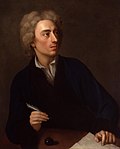
An Essay on Criticism is one of the first major poems written by the English writer Alexander Pope (1688–1744), published in 1711. It is the source of the famous quotations "To err is human; to forgive, divine", "A little learning is a dang'rous thing" (frequently misquoted as "A little knowledge is a dang'rous thing"), and "Fools rush in where angels fear to tread".
Composition
The first fragmentary drafts of the work were written in Abberley in 1707. It was first published in May 1711. Many of the poem's ideas had existed in prose form since at least 1706. Composed in heroic couplets (pairs of adjacent rhyming lines of iambic pentameter) and written in the Horatian mode of satire, it is a verse essay primarily concerned with how writers and critics behave in the new literary commerce of Pope's contemporary age. The poem covers a range of good criticism and advice, and represents many of the chief literary ideals of Pope's age.
Structure and themes
The verse "essay" was not an uncommon form in eighteenth-century poetry, deriving ultimately from classical forebears including Horace's Ars Poetica and Lucretius' De rerum natura.
Pope contends in the poem's opening couplets that bad criticism does greater harm than bad writing:
'Tis hard to say, if greater Want of Skill
— lines 1–8
Appear in Writing or in Judging ill;
But, of the two, less dang'rous is th' Offence,
To tire our Patience, than mis-lead our Sense:
Some few in that, but Numbers err in this,
Ten Censure wrong for one who Writes amiss;
A Fool might once himself alone expose,
Now One in Verse makes many more in Prose.
Pope delineates common faults of poets, e.g., settling for easy and clichéd rhymes:
And ten low Words oft creep in one dull Line,
— lines 347–353
While they ring round the same unvary'd Chimes,
With sure Returns of still expected Rhymes.
Where-e'er you find the cooling Western Breeze,
In the next Line, it whispers thro' the Trees;
If Crystal Streams with pleasing Murmurs creep,
The Reader's threaten'd (not in vain) with Sleep.
Throughout the poem, Pope refers to ancient writers such as Virgil, Homer, Aristotle, Horace and Longinus. This is a testament to his belief that the "Imitation of the ancients" is the ultimate standard for taste. Pope also says, "True Ease in Writing comes from Art, not Chance,/ As those move easiest who have learn'd to dance" (362–363), meaning poets are made, not born.
As is usual in Pope's poems, the Essay concludes with a reference to Pope himself. William Walsh, the last of the critics mentioned, was a mentor and friend of Pope who had died in 1708.
Part II of An Essay on Criticism includes a famous couplet:
A little Learning is a dangerous thing;
— lines 215–216
Drink deep, or taste not the Pierian Spring:
This is in reference to the spring in the Pierian Mountains in Macedonia, sacred to the Muses. The first line of this couplet is often misquoted as "a little knowledge is a dangerous thing".
The Essay also gives this famous line (towards the end of Part II):
To Err is Human; to Forgive, Divine.
— line 525
The phrase "fools rush in where angels fear to tread" from Part III (line 625) has become part of the popular lexicon, and has been used for and in various works.
Critical reception
An Essay on Criticism was famously and fiercely attacked by John Dennis, who is mentioned mockingly in the work. Consequently, Dennis also appears in Pope's later satire, The Dunciad.
Thomas Rymer and Jonathan Swift were among other critics: Rymer, who had the strongest critique said, "till of late years England was as free from critics as it is from wolves...they who are least acquainted with the game are aptest to bark at everything that comes in their way."; Swift's statement concentrated on critics who were damned "as barbarous as a judge who should take up a resolution to hang all men that came before him upon trial."
Notes
- Mack 1985, p. 168.
- Mack 1985, p. 177.
- Sitter 2011, p. 34.
- Pope 1963, p. 144
- Pope 1963, p. 154
- Pope 1963, p. 155
- Pope 1963, p. 151
- Pope 1963, p. 160
- Pope 1963, p. 163
- In the 1947 film The Bishop's Wife, Dudley—an angel—at one point says to the bishop, "Angels rush in where fools fear to tread," playing on this phrase (while disrupting its metrical pattern).
References
- Mack, Maynard (1985). Alexander Pope: A Life. Yale University Press. ISBN 0-300-03391-5.
- Pope, Alexander (1963). Butt, John (ed.). The Poems of Alexander Pope (a one-volume edition of the Twickenham text ed.). Yale University Press. ISBN 0300003404. OCLC 855720858.
- Price, Martin, ed. (1973). The restoration and the eighteenth century. New York: Oxford University Press. pp. 311–312. ISBN 0-19-501614-9. OCLC 2341106.
- Sitter, John (2011). The Cambridge Introduction to Eighteenth-Century Poetry. Cambridge University Press. ISBN 978-0-521-84824-4.
External links
- An Essay on Criticism at Project Gutenberg (much punctuation is missing)
- A Study Guide for the Essay, by Walter Jackson Bate
 An Essay on Criticism public domain audiobook at LibriVox
An Essay on Criticism public domain audiobook at LibriVox
| Alexander Pope | ||
|---|---|---|
| Plays |
|  |
| Essays | ||
| Poetry |
| |
| Related | ||
| People | ||